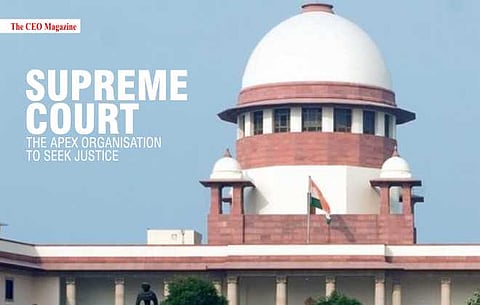
- News
- Women
- Magazine
- IndustryIndustry
- InsightsInsights
- Success Stories
- PublishPublish
- ContactContact
- Media KitMedia Kit

SUPREME COURT OF INDIA, THE APEX ORGANISATION TO SEEK JUSTICE
SUPREME COURT OF INDIA, THE APEX ORGANISATION TO SEEK JUSTICE
In the judiciary system of India, the supreme court is at the apex and is the highest authority to uphold the constitution of India, to protect the rights and liberties of citizens, and to uphold the values of rule of law. The guardian of our Constitution, the highest constitutional court, with the power of judicial review consist of the Chief Justice of India and a maximum of 34 judges, it has extensive powers in the form of original, appellate and advisory jurisdictions.
According to Article 124(1) and Amendment act of 2008, there shall be a Supreme Court of India consisting of a Chief justice of India (CJI) and 34 judges including the CJI.
Article 124(2) states that every judge of the Supreme Court shall be appointed by the President by warrant under his hand and seal after consultation with such of the judges of the Supreme Court and the High Courts in the states.
There is a collegium system/ appointment of judges to the courts, also known as the three judges cases, which comprises of the Chief Justice of India and four senior-most judges of the SC, one chief justice of a high court and two of its senior-most judges, this system demanded a consensus decision of all the senior-most judges in conformity with the Chief Justice of India.
However, due to lack of transparency and delay in the appointment, a new article 124 A was incorporated in the constitution, under which the collegium system was replaced by the National Judiciary Appointments Commission (NJAC) for the appointment of judges as mandated in the existing pre-amended constitution by a new system.
The NJAC consists of the following persons:
Functions of the Commission are as follows:
The constitutional court of the country takes up appeals primarily against verdicts of the high courts of various states of the Union and other courts and tribunals. It also safeguards the fundamental rights of citizens and settles disputes between various government authorities as well as the central government vs state governments or state governments versus another state government in the country.
In the role of an advisory court, it hears matters which may specifically be referred to it under the constitution by President of India. The law declared by the supreme court becomes binding on all courts within India and also by the union and state governments.
As per Article 142 of the constitution, the President of India must enforce the decrees of the supreme court and the court is conferred with the inherent jurisdiction to pass any order deemed necessary in the interest of justice.
Currently, the Hon'ble Chief Justice of India is Hon'ble Mr Justice Sharad Arvind Bobde who will be serving a term in the office: (DoA) 12-04-2013 to (DoR) 23-04-2021. Born on 24.04.1956 at Nagpur, Maharashtra, son of Shri Arvind Shriniwas Bobde, Bobde took B.A. and LL.B. Degrees from Nagpur University and enrolled on the Roll of the Bar Council of Maharashtra in 1978. He practised Law at the Nagpur Bench of the Bombay High Court with appearances at Bombay before the Principal Seat and before the Hon'ble Supreme Court of India for over 21 years.
Designated as Senior Advocate in 1998.
Elevated to the Bench of the Bombay High Court on 29th March 2000, as Additional Judge.
Sworn in as Chief Justice of Madhya Pradesh High Court on 16th October 2012.
Elevated as a Judge of Supreme Court of India on 12th April 2013.
Sworn in as Chief Justice of India on 18th November 2019.
Due to retire on 23rd April 2021.
To be a judge in Supreme Court of India, one should be a citizen of India not exceeding 65 years age as per Article 124 of the constitution who has been :
There are currently 32 judges including the Chief Justice of India and maximum possible strength is 34. As per the Constitution of India, judges of the Supreme Court retire at age of 65.
Source: Wikipedia
Official website of Supreme Court Of India
Follow us on Google News
